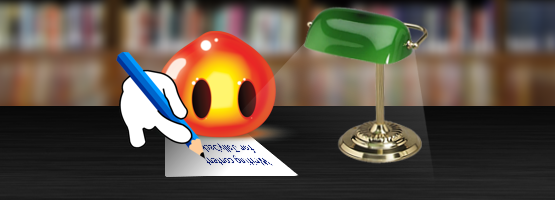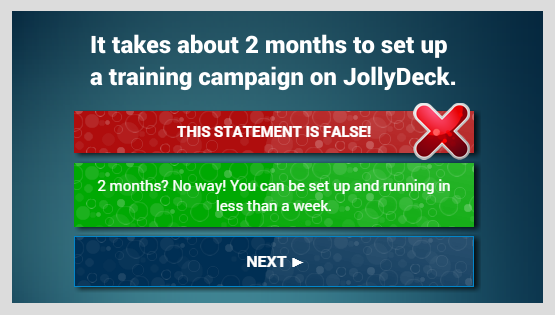The best practices & tips for writing good JollyDeck content

The saying, ‘the whole is only as good as the sum of its parts’ is ever more true within JollyDeck because well-written quiz content can make the learning even more impactful.
We’ve honed the skill of being content wizards and are passionate about helping our clients create relevant, well-written questions which are at the heart of a JollyDeck campaign.
So ‘What makes a question in a JollyDeck training ‘well-written’? Keep reading and you’ll get insight into all the best practices.
First things first
Whenever you set out to prepare for a training you need to sort out the basics first:
- What the training will be about and who is your audience?
- Is this an issue they are learning for the first time, or do they already have some prior knowledge about it?
- Is this part of a broader training effort or is it the primary way participants will learn about this topic?
Taking time to think about these factors will give you an opportunity to set the foundations of your training in a way that will guarantee its success and ultimately help you achieve your business goals.
It’s about the goals…
When preparing the content the overall goal of the training should always be the first thing to consider. Ideally, you would write down the specific knowledge goals for each issue you want to cover. And once you’ve written the questions you need to go back to the goals and consider if they match. They need to be aligned and the questions should tell the story in a way that all the goals are covered.
… and balance!
Once you’ve set your goals think about them again from another perspective. Having a good understanding of how much can be achieved in one training is another factor that will determine success. Try to keep your goals balanced with results that are achievable.
Content: the Heart of the Training
When we talk content creation in the JollyDeck dictionary we’re speaking about facts and propositions. Skill-based knowledge is it’s own animal. But facts and propositions is raw content that is wholly accurate and reliable. JollyDeck content is presented through True-False questions and Multiple Choice, a simple and familiar format for both the content creators and the learners.

Rules to Write By:
Clarity
Use simple and clear language, understandable to your average learner and choose precise wording. Make sure that you use the same terminology throughout the whole set of questions prepared for the training.
Focus
Statements should be kept brief and to the point. One statement should express one message.
Explanation
When statement provided is false it’s strongly encouraged to add the true statement. This gives the learner immediate feedback and helps him score better the next time they play. Sometimes even a true statement works better with an explanation and we support that kind of information sharing in the game as well!
Priority
Identify your important questions. Some facts are more important than others, we can give these questions greater significance in the JollyDeck campaign to increase their visibility to the learners.
Segment
Divide your questions into chapters – we can analyze the knowledge gaps as well as gains on the overall content, but also on specific content chapters. Segmenting your content allows you to de-risk your learning by identifying what your learners know!
Be playful!
Training is not supposed to be boring, no matter how dull you might think your content is. And training with JollyDeck is not boring in any sense, so the more fun you have with the content the more fun your trainees will have – the better their engagement will be! You can play with the content, make it funny and ask unexpected questions.
Think about it like this: if you can squeeze a good joke into a text message, than you can squeeze it into your JD training as well. Works wonders!

